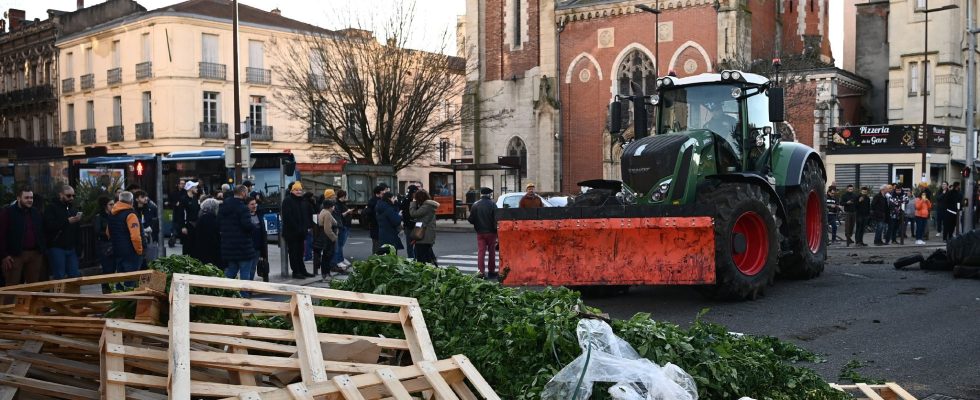Tractors posted on the roads, manure dumped in front of prefectures: the anger of farmers, who have been demonstrating since mid-January, reveals scenes repeated many times. The profession, whose standard of living is the subject of frequent demands, has mobilized on several occasions over the last twenty years in France, sometimes to oppose the entry into force of new standards, sometimes to try to put pressure on mass distribution. These actions reveal many points in common with current mobilizations. Overview.
June 2018: import of foreign products
Just a few months after the mobilization against the new agricultural map of disadvantaged areas, in June 2018, farmers blocked fuel depots and refineries at the call of the FNSEA. Up to 18 sites will be affected. The action, however, has no link with the price of fuel: as part of the “#SaveTheAgri” movement, farmers are protesting against the importation of foreign products which, according to them, do not respect French and European standards, including palm oil intended for use in a Total refinery. The movement was lifted after obtaining guarantees from the Ministry of Agriculture.
These actions nevertheless reveal dissensions between agricultural unions. The Peasant Confederation and the Rural Coordination, two minority unions, separately denounce the FNSEA demonstrations. The two organizations are opposed to the use of vegetable oils, and particularly rapeseed oils, for biofuel, believing that they would be better used in human food.
In the current movement, although the unions share many demands, they continue to oppose each other on certain points. The Rural Coordination thus criticized the FNSEA for the role played in the negotiations with the government on the taxation of non-road diesel (GNR). As for the Peasant Confederation, it is not opposed to the establishment of environmental standards at European level, unlike the other unions.
February 2018: map of disadvantaged areas
Demonstrations were organized in February 2018 by farmers opposed to a project to reform the map of disadvantaged agricultural areas, which risks reducing the number of municipalities eligible for certain European aid. The mobilization is mainly concentrated in the South-West, where several departments are impacted. Various roads, including the A64, are paralyzed.
Faced with protests, the Ministry of Agriculture proposed a modification of the map, and the movement stopped. Some, however, remain dissatisfied: according to the Farmers’ Confederation, the modification “resolves nothing” to the problems of farmers located in municipalities who will no longer be eligible.
Today, the conditions for granting European Union aid are once again being singled out by mobilized farmers. Certain obligations, such as the fallowing of 4% of plots necessary for the payment of certain aid, are contested by the unions.
January 2016: fall in prices
From the end of January 2016, breeders “desperate” by the fall in pork, milk and beef prices launched actions to block roads. The mobilization extends particularly to the west of France. The mobilization, led by the FNSEA and the Young Farmers, is gradually abandoning the roadblocks, but blockades of large-scale distribution logistics centers are also organized.
The Minister of Agriculture at the time, Stéphane Le Fol, then announced an increase of 125 million in the support plan for cattle, pig and dairy farming, initially of 700 million euros. In mid-February, while a show of force was organized around Rennes with nearly 500 tractors, Prime Minister Manuel Valls announced a reduction in social charges for all farmers. The movement stops.
June 2009: pressure on mass distribution
In June 2009, several large-scale supply platforms in Brittany and Pays-de-la-Loire were blocked by farmers, who denounced margins that were too low on their production.
The movement spread and quickly more than half of the supply platforms of large stores were paralyzed, causing supply disruptions. The FNSEA then reported 7,000 farmers mobilized. They are demanding in particular a reform of the economic modernization law adopted the previous year and which, according to them, “strengthens the powers of mass distribution”.
The government ultimately promises widespread price controls and possible “sanctions” to appease farmers, putting an end to the movement.
Tensions between farmers and large retailers are nevertheless recurrent, and once again constitute one of the essential points of the current mobilization. The FNSEA and the Young Farmers union, which presented a list of demands to the government yesterday, are demanding compliance with the Egalim laws, which are supposed to govern negotiations with large-scale distribution.
The latter is always accused of putting pressure on prices, to the detriment of farmers’ remuneration. “Fair remuneration is essential to value the work of farmers and give them perspectives and clarity about the future,” the two unions wrote in a press release. “This long-standing problem must find its answer in the full application of the Egalim laws.”
October 2004: zero-rating of fuel oil
In October 2004, and faced with soaring oil prices, the Young Farmers movement organized actions to block several fuel depots and refineries. Professionals are therefore calling for a tax reduction on fuel oil for agricultural use.
At the height of the movement, the Young Farmers blocked around ten sites throughout France. They ended to avoid clashes with the police, but the demonstrators changed tactics by organizing “free toll” operations on highways. The mobilization died down, and in 2005 the government announced the extension of aid measures.
A mobilization which recalls one of the main demands of the current anger movement, since farmers are today demanding aid in the face of the government’s decision to reduce tax assistance on non-road diesel (NGR).
